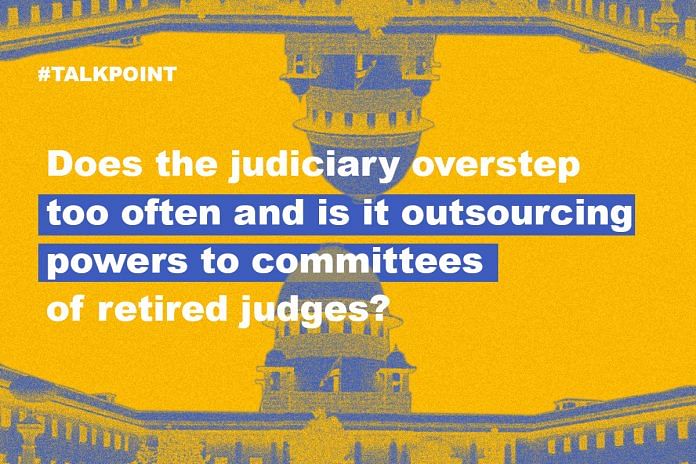Three significant comments made this weekend reignited the debate about separation between the judiciary and the executive.
President Ram Nath Kovind cautioned that the judiciary, the executive, and the legislature “need to be careful not to cross into each other’s finely-defined spaces. Or give the opportunity to read transgressions even when none is intended“.
Prime Minister Narendra Modi said “the balance between the legislature, judiciary, and executive has been the backbone of our Constitution. Because of this balance, our nation was able to defeat Emergency… we have to fulfil the people’s hopes and aspirations while remaining within our limits”.
Chief Justice Dipak Misra said “there is a perception that there is judicial activism”, adding that “there is no desire to enter policy making”.
ThePrint asks experts: Is the judiciary stepping into executive domain too often and outsourcing its powers to committees of retired judges?
During the 2G hearings launched by the BJP’s Subramanian Swamy, the bench of Justices Singhvi and Ganguly were given the familiar argument — that courts should not wade into policy matters, and should remain within the ‘Lakshman Rekha’ of judicial deference to executive wisdom. Justice Ganguly retorted, “It was only when Sita crossed the Lakshman Rekha that Ravan got killed”.
Killing the Ravan of supposed corruption in 2G was greatly applauded by the BJP, whose media megaphones amplified the court’s strictures into a campaign endorsement against the UPA.
Today Swamy’s BJP is in power, but is, in turn, singing the same tune of judicial overreach.
Every government, particularly one with a large majority, feels discomfited when an unelected judiciary faults its actions on the anvil of legality. Franklin Delano Roosevelt in the USA threatened to pack the Supreme Court, if ‘New Deal’ legislation repeatedly got struck down. Indira Gandhi called for a “committed judiciary”, in tune with her socialistic government. Theresa May in Britain had the UK Supreme Court telling her that she needed parliamentary approval for Brexit.
Here are other sharp perspectives on judicial overreach:
Alok Prasanna Kumar, Senior Resident Fellow at Vidhi Centre for Legal Policy
Faizan Mustafa, Vice-Chancellor, NALSAR University of Law
Shekhar Gupta, Editor-in-Chief, ThePrint
Courts finding legal impediments to government policy are only doing their jobs. But under cover of fairness requirements, when courts provide or substitute their policy alternatives to replace existing administrative measures, that is when Sita steps out of the Lakshman Rekha, in search of the illusory golden deer of judicial overreach, masquerading as activism.
“The most important thing we do is not doing,” Justice Brandeis once remarked to Felix Frankfurter, his fellow judge of the US Supreme Court.
Indian judges may do well to occasionally nod to Brandeis as they genuflect to Justice Bhagwati.
Sanjay Hegde is a senior advocate at the Supreme Court.



